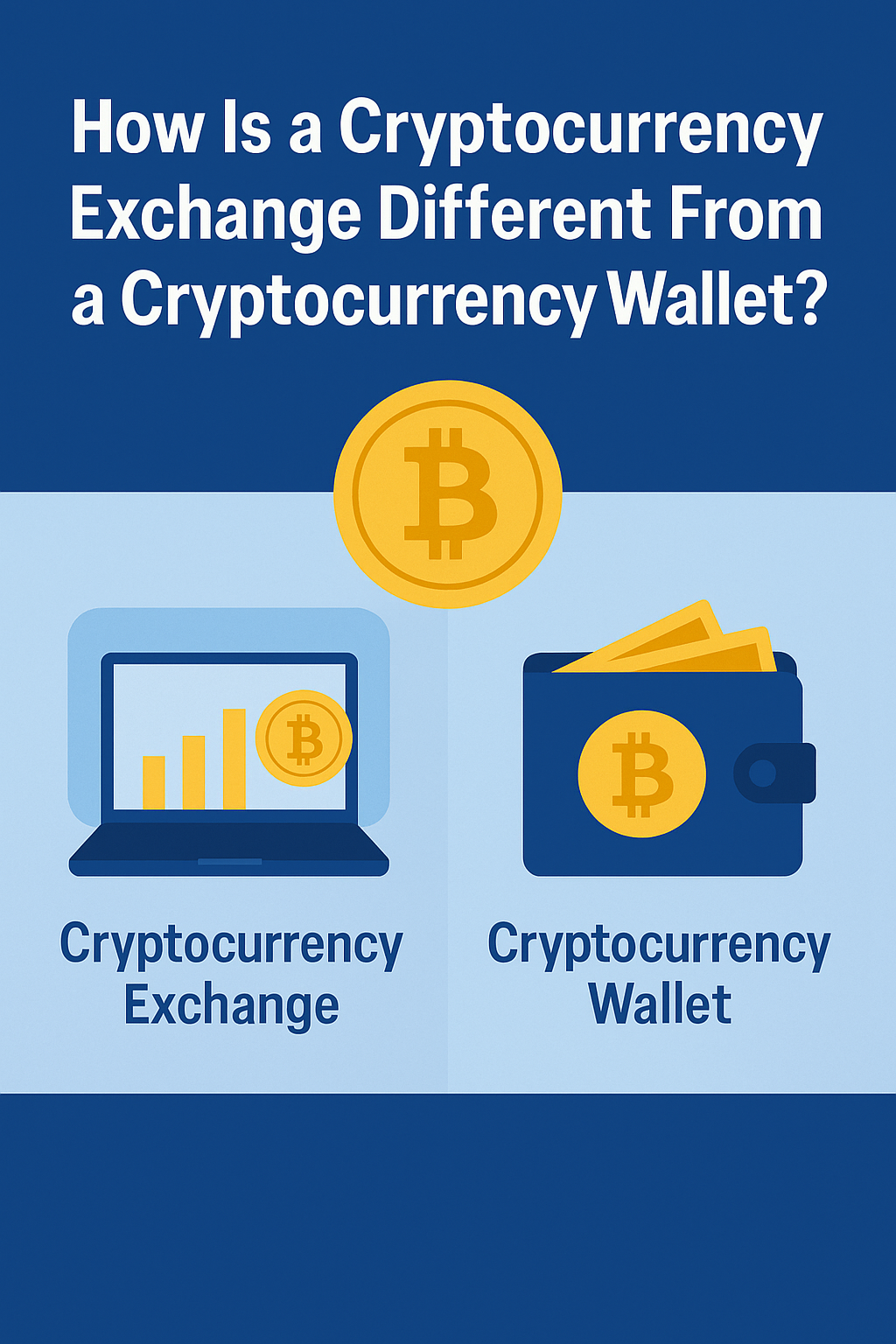As cryptocurrency becomes more mainstream, it’s important to understand the tools you use to manage your digital assets. One of the most common questions for beginners is:
How is a cryptocurrency exchange different from a cryptocurrency wallet?
Though both are essential to any crypto journey, they serve completely different purposes. In this guide, we’ll break down the roles, features, and security differences between exchanges and wallets, so you can use both wisely.
🔁 What Is a Cryptocurrency Exchange?
A cryptocurrency exchange is an online platform that allows users to buy, sell, and trade cryptocurrencies. Think of it as a digital marketplace, much like a stock exchange, but for assets like Bitcoin, Ethereum, and thousands of altcoins.
Main functions of an exchange:
- Trading between crypto and fiat (e.g., USD to BTC)
- Crypto-to-crypto trades (e.g., ETH to SOL)
- Offering features like margin trading, futures, staking, and more
- Providing real-time charts, market analytics, and price alerts
Some of the most popular exchanges include Binance, Coinbase, Kraken, and KuCoin.
When asking how is a cryptocurrency exchange different from a cryptocurrency wallet, remember this: exchanges focus on transactions and liquidity.

🔐 What Is a Cryptocurrency Wallet?
A cryptocurrency wallet is a tool—either software or hardware—that allows you to store your digital assets securely. While exchanges hold your funds for trading, wallets give you full control over your private keys and security.
Main functions of a wallet:
- Storing crypto safely
- Sending and receiving tokens
- Viewing balances and transaction history
- Acting as your digital vault
Wallets come in various types:
- Hot Wallets: Software-based and internet-connected (e.g., MetaMask, Trust Wallet)
- Cold Wallets: Hardware-based and offline (e.g., Ledger, Trezor)
So, how is a cryptocurrency exchange different from a cryptocurrency wallet? Wallets don’t facilitate trading—they safeguard your assets.
🧩 Key Differences: Exchange vs. Wallet
| Feature | Cryptocurrency Exchange | Cryptocurrency Wallet |
|---|---|---|
| Purpose | Buy/sell/trade crypto | Store and manage crypto securely |
| Ownership of Keys | Exchange holds your keys (custodial) | You hold your keys (non-custodial) |
| Security Risk | Higher (target for hacks) | Lower (especially cold wallets) |
| Accessibility | Easy access, user-friendly | More secure, sometimes technical |
| Features | Trading, analytics, staking | Sending, receiving, storing only |
Understanding how is a cryptocurrency exchange different from a cryptocurrency wallet helps you decide when to use each tool effectively.
🛡️ Security: Where Should You Store Your Crypto?
Exchanges are convenient—but come with risks. Over the years, platforms like Mt. Gox and FTX have taught us that not your keys, not your coins.
That’s why many investors:
- Trade on exchanges
- Then transfer to a private wallet for long-term holding
So, when considering how is a cryptocurrency exchange different from a cryptocurrency wallet, remember: exchanges are best for short-term trades, wallets for long-term safety.
🌍 Use Case Scenarios: When to Use Each
Use a Cryptocurrency Exchange when:
- You want to buy or sell crypto instantly
- You’re actively trading or converting currencies
- You need access to liquidity and market tools
Use a Cryptocurrency Wallet when:
- You want to hold crypto for months or years
- You prioritize self-custody and privacy
- You’re securing large amounts of crypto offline
This practical distinction clarifies how is a cryptocurrency exchange different from a cryptocurrency wallet for everyday users.
📱 Can You Use Both Together? Absolutely.
Here’s how many smart crypto users operate:
- Buy on Exchange – Purchase BTC or ETH on Binance or Coinbase
- Transfer to Wallet – Move it to a secure cold wallet like Ledger
- Return to Exchange – Only when you want to trade, convert, or cash out
This combo gives you flexibility with trading and the peace of mind that your funds are safe when not in use.
🧠 Conclusion
So, how is a cryptocurrency exchange different from a cryptocurrency wallet? It’s simple:
- Exchanges are for trading and converting crypto
- Wallets are for storing and protecting your assets
Both tools are essential—but they serve distinct roles. Knowing when and how to use each will protect your funds, streamline your trading experience, and make you a smarter crypto investor in 2025.
You may also read this : How to Scale Cryptocurrency Exchange: A Step-by-Step Guide for 2025

